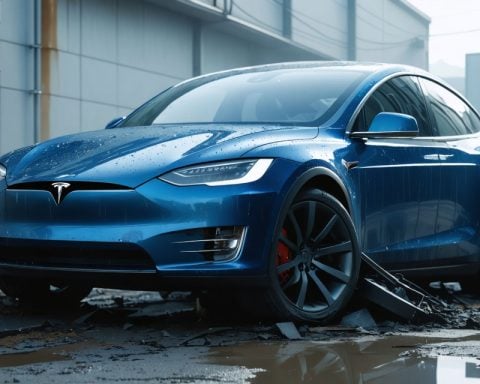- Global protests against Tesla highlight dissatisfaction with Elon Musk’s leadership and political affiliations.
- Activists accuse Musk of misusing company funds and fostering controversial political ties.
- Musk’s role in the Trump administration and ensuing controversies have led to investor concerns and legal challenges.
- Public opinion polls indicate disapproval of Musk’s political activities, with a distinct gender divide.
- Concerns about Musk’s political identity negatively impact Tesla’s brand image and market position.
- With weaker sales in Germany and China and policy uncertainties around EV tax credits, Tesla’s market dominance appears at risk.
- The future of Tesla amidst changing political landscapes and internal unease hinges on its ability to adapt beyond Musk’s shadow.
Protests erupted at Tesla showrooms worldwide this weekend, with demonstrators accusing Elon Musk of steering both his company and his image off course. Dubbed the “Tesla Takedown” and “Tesla Takeover,” these protests, orchestrated by activists on emerging social sites, painted a vivid picture of discontent. Banners bore accusations: “Musk is stealing from you” and “Tesla funds fascists,” echoing through New York City and reverberating in Austin, Boston, and beyond.
Musk’s prominent role in the Trump administration—specifically as head of the controversial Department of Government Efficiency—has sparked fury. His mass firings of government employees have triggered lawsuits questioning their legality. As these allegations unfold, Tesla’s stock wavers, underlining a growing investor unease. A recent poll revealed a significant portion of voters disapproves of Musk’s political endeavors, with a noticeable gender divide in sentiment.
Once revered as the “EV Jesus,” Musk’s new political identity clouds Tesla’s once-bright halo. Veteran strategists suggest his MAGA-tinged reputation tarnishes the brand he built. This identity shift affects Tesla’s standing among potential EV buyers, currently lagging behind competitors like Ford and VW in public favorability.
As federal EV tax credits hang in the balance, Tesla’s edge in the electric vehicle market seems increasingly frail. Globally, sales numbers falter, with steep declines in key markets such as Germany and China hinting at a broader malaise. The whispers within Tesla suggest unease, with some employees contemplating a future beyond Musk’s leadership.
In this electric age, the stakes are high. As Tesla grapples with an evolving landscape and Musk maneuvers through political terrain, the question remains: Can the brand survive the weight of its creator’s ambitions?
Trouble at Tesla: Can Elon Musk’s Political Ventures Derail the EV Pioneer?
The Intersection of Politics and Electric Vehicles: Understanding Tesla’s Current Challenges
Tesla, once synonymous with innovation and sustainability in the electric vehicle (EV) sector, is now grappling with a complex set of challenges, many of which are rooted in CEO Elon Musk’s political endeavors. Let’s delve deeper into these challenges and explore their implications for Tesla’s future.
How-To Steps & Life Hacks
Adapting to Tesla’s Fluctuating Market:
1. Stay Updated on Stock Movements:
Use financial news apps to track Tesla’s stock performance. Tools like Bloomberg and Yahoo Finance provide real-time updates and expert analysis.
2. Use Tesla’s Advanced Features:
Maximize the value of your Tesla by utilizing its software updates, often designed to enhance vehicle performance and user experience.
3. Engage with the Tesla Community:
Join forums like Tesla Motors Club where users share tips, maintenance hacks, and experiences.
Real-World Use Cases
Tesla remains a pioneer in the EV market despite its challenges, known for innovations such as:
– Autopilot and Full Self-Driving Capabilities: Offering degrees of automated driving that enhance safety and ease.
– Energy Solutions: Through SolarCity, Tesla provides solar panels and storage solutions, playing a significant role in sustainable energy.
Market Forecasts & Industry Trends
The EV Market Landscape:
– Competitors Gaining Ground: Ford and Volkswagen are increasing their market share with new electric models, focused on affordability and range (Source: Forbes).
– Global EV Adoption: The International Energy Agency predicts exponential growth in EV adoption, with government incentives being a crucial driver.
Reviews & Comparisons
Tesla vs. the Competition:
– Performance: Tesla still leads in range and acceleration, but rivals are catching up in technology features and pricing.
– Customer Satisfaction: While generally high, Tesla’s customer service and build quality often receive mixed reviews.
Controversies & Limitations
Musk’s ties to the Trump administration and his role in the Department of Government Efficiency have sparked protests. Allegations of legal misconduct concerning government employee firings have impacted Tesla’s stock value, reflecting growing investor anxiety (Source: BBC).
Features, Specs & Pricing
Current Tesla Models:
– Model 3: Starting at around $39,990, it offers a balance of price, range, and features.
– Model Y: Popular for its spaciousness and family-friendly design.
– Model S and X: Luxury options with higher price points and advanced features.
Security & Sustainability
Tesla’s commitment to sustainability is evident through its zero-emission vehicles and its Gigafactory’s focus on eco-friendly production processes. However, recent tensions highlight potential gaps in security as political affiliations spark public dissent.
Pros & Cons Overview
Pros:
– Leader in EV technology.
– Global charging network.
– Strong brand recognition.
Cons:
– Political controversies.
– High profile but sporadic customer service.
– Increased competition.
Actionable Recommendations
1. For Investors: Diversify portfolios to mitigate risks associated with Tesla’s volatility.
2. For Consumers: Consider waiting for new models if pricing is an issue, as competition is likely to impact costs favorably.
3. For Industry Observers: Monitor legislative changes in EV incentives, as they will be pivotal for Tesla and its competitors.
In conclusion, Tesla stands at a crossroads, facing significant challenges both internally and externally. As the company navigates these turbulent waters, its ability to innovate and adapt will determine its future success. For the latest in technology and automotive trends, visit CNBC.












